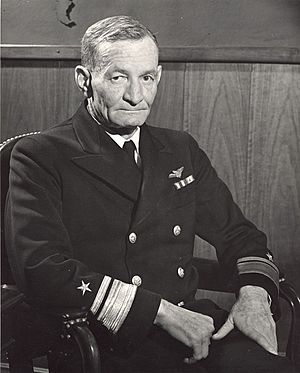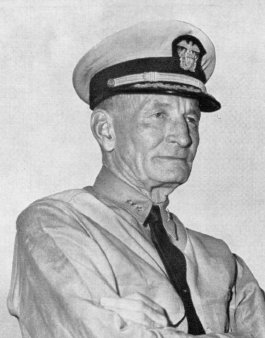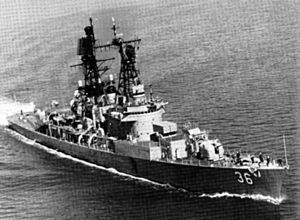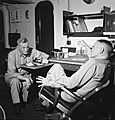John S. McCain, Sr. facts for kids
Quick facts for kids
John S. McCain, Sr.
|
|
|---|---|
 |
|
| Birth name | John Sidney McCain |
| Nickname(s) | "Slew" |
| Born | August 9, 1884 Carroll County, Mississippi, U.S. |
| Died | September 6, 1945 (aged 61) Coronado, California, U.S. |
| Place of burial |
Arlington National Cemetery
|
| Allegiance | |
| Service/ |
|
| Years of service | 1906–1945 |
| Rank | |
| Commands held | USS Ranger Air Forces for Western Sea Frontier and the South Pacific Force Bureau of Aeronautics Second Fast Carrier Force Task Group 38.1 Task Force 38 |
| Battles/wars | World War I World War II
|
| Awards | Navy Cross Navy Distinguished Service Medal (3) |
John Sidney "Slew" McCain Sr. (born August 9, 1884 – died September 6, 1945) was a highly respected U.S. Navy admiral. He was known for his important leadership roles during the Pacific campaign in World War II. Admiral McCain was also a pioneer in how aircraft carriers were used in naval battles.
During the war, he commanded air operations that supported the Guadalcanal campaign in 1942. Later, in 1944-1945, he bravely led the Fast Carrier Task Force. His actions near the Philippines and Okinawa, and his air strikes against Formosa and the Japanese home islands, caused huge damage to Japan's navy and air forces. He passed away just four days after Japan officially surrendered, ending World War II.
Contents
John Sidney McCain was born in Carroll County, Mississippi. His father, also named John Sidney McCain, was a plantation owner.
He first studied at the University of Mississippi for two years. He then planned to attend the United States Military Academy at West Point, where his brother was a student. To prepare for the entrance exams, he decided to try the exams for the United States Naval Academy. When he passed those and was accepted, he chose to join the Navy instead. This decision meant he would leave his family's plantation life behind for a career at sea.
At the Naval Academy, he had some hearing problems. However, he was still allowed to join because the Navy greatly needed officers. When he graduated in 1906, he was 79th in a class of 116 students. In 1909, he married Catherine Davey Vaulx in Colorado Springs, Colorado. They had one child together.
Leading the Way in World War II
Admiral McCain played a key role in the Pacific War. He was a strong supporter of using aircraft carriers in battle. These large ships could launch and land planes, which was a new and powerful way to fight at sea.
In 1942, he was in charge of all land-based air operations that helped the Guadalcanal campaign. This was a very important battle early in the Pacific War. Later, from 1944 to 1945, he commanded the Fast Carrier Task Force. This was a huge group of aircraft carriers and other warships.
His forces launched powerful air strikes against Japanese targets. These attacks helped destroy many Japanese ships and planes, especially during the battles for the Philippines and Okinawa. His leadership helped the Allies win important victories in the final stages of the war.
Death and Lasting Legacy
Admiral McCain died on September 6, 1945, in Coronado, California, at the age of 61. He passed away from a heart attack. His death was considered very important news at the time. He was buried at Arlington National Cemetery, a special place where many American heroes are laid to rest.
Admiral McCain left behind a strong legacy, especially in his family. He and his son, Admiral John S. McCain Jr., were the first father-son pair in U.S. Navy history to both become four-star admirals. His grandson, John S. McCain III, became a U.S. Senator and ran for president in 2008. His great-grandson, John S. McCain IV, also serves in the Navy.
To honor his service, McCain Field at Naval Air Station Meridian in Mississippi was named after him. Also, two U.S. Navy destroyers have been named after him:
- The USS John S. McCain (DL-3) (in service from 1953 to 1978).
- The USS John S. McCain (DDG-56) (in service since 1994), which is named for both Admiral John S. McCain Sr. and his son, Admiral John S. McCain Jr.
Images for kids
-
McCain as a young ensign listens to President Theodore Roosevelt as he stands on a gun turret to address the officers and men of the USS Connecticut (BB-18), upon its return as a part of the Great White Fleet in February 1909 in Hampton Roads, Virginia
-
John S. "Slew" McCain Sr. and John S. "Jack" McCain Jr., on board a U.S. Navy ship in Tokyo Bay, c. September 2, 1945. The senior McCain died four days later.
 | Sharif Bey |
 | Hale Woodruff |
 | Richmond Barthé |
 | Purvis Young |








